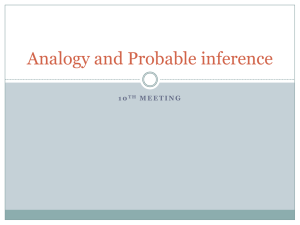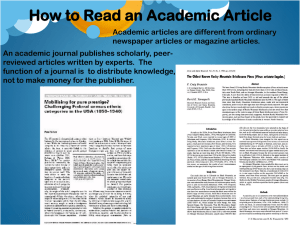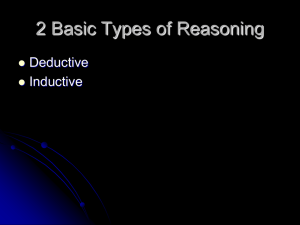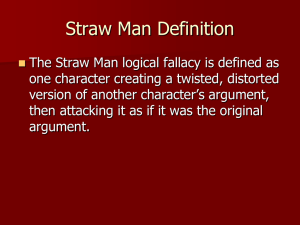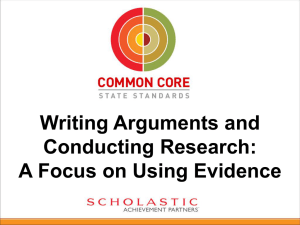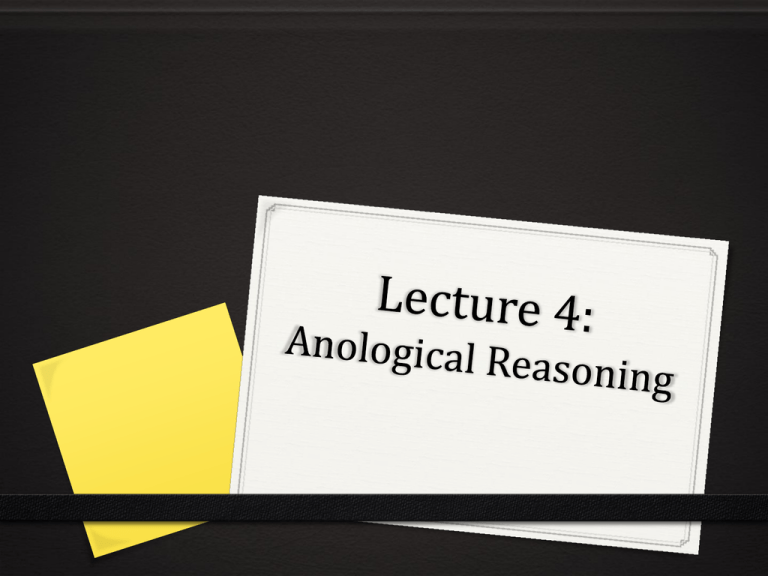
• Remember this argument?
• 1. She who has learned medicine practices an art and
•
•
•
•
•
acts in accordance with that art.
2. Similarly, she who has learned justice practices an
art.
∵ 3. She who has learned justice acts in accordance
with her art, i.e., is just.
4. The orator has learned justice.
∴ 5. The orator is just.
∴ 6. The orator will “never want to do what’s unjust”
(19).
• 1. She who has learned medicine practices an art and
acts in accordance with that art.
• 2. Similarly, she who has learned justice practices an
art.
• ∵ 3. She who has learned justice acts in accordance
with her art, i.e., is just.
• This part of the argument is an analogical argument.
• To draw an analogy between two things x and y is to
indicate at least one respect in which x is similar to y.
Examples:
• Swordplay is a dance of sorts, an understanding of
the logical, most sophisticated next step. (Lisa Tawn
Bergren)
• As smoking is to the lungs, so is resentment to the
soul; even one puff is bad for you. (Elizabeth Gilbert)
• Sports is to war as pornography is to sex. (Jonathan
Haidt)
Analogies can be useful for:
• Literary flourishes
• Explanation
• Arguments
Literary flourishes:
• You ain’t nothin but a hound dog.
Explanation:
• The atom is like a little solar system: in an atom,
electrons orbit a nucleus of protons and neutrons;
similarly, in a solar system, planets orbit a star.
Argument
• Three of my friends bought their computers on the
internet and they were all unhappy with them. I was
thinking about ordering my new computer online but
now it looks like if I do, I’ll be unhappy with it.
An analogical argument is an argument with the
following traits:
• Some of its premises draw an analogy between
(indicate properties shared by) multiple things x1,
x2,…,xn and y;
• Other premises ascribe some further property P to
x1, x2,…,xn; and
• The conclusion ascribes P to y.
• Three of my friends bought their computers on the
internet and they were all unhappy with them. I was
thinking about ordering my new computer online but now
it looks like if I do, I’ll be unhappy with it.
• Some of its premises draw an analogy between (indicate
properties possessed by) multiple things x1, x2,…,xn and y.
•
•
•
•
x1: computer bought by friend 1
x2: computer bought by friend 2
x3: computer bought by friend 3
y: computer I was thinking of buying
• Property possessed by x1, x2,…,xn and y: being bought on
the internet.
• Three of my friends bought their computers on the
internet and they were all unhappy with them. I was
thinking about ordering my new computer online but
now it looks like if I do, I’ll be unhappy with it.
• Other premises ascribe some further property P to x1,
x2,…,xn.
• Further property P: displeasing owner.
•
Three of my friends bought their computers on the internet and
they were all unhappy with them. I was thinking about ordering
my new computer online but now it looks like if I do, I’ll be
unhappy with it.
• The conclusion ascribes P to y.
• y: the computer I’m thinking of buying.
• P: displeasing owner.
• Ascription of P to y: I’ll be unhappy with the computer I
was thinking about ordering.
Identify the three traits of an analogical argument in
each of the following arguments.
• There might be life on Europa because it has an
atmosphere that contains oxygen just like the Earth.
• I am scared to let Susan see me in this sweater. A
couple of my other friends told me it makes me look
like a child, and she’s at least as critical as they are.
• A watch could not assemble itself, because it’s too
complex. The universe is at least as complex as a
watch. So the universe could not have assembled
itself either.
• There might be life on Europa because it has an
atmosphere that contains oxygen just like the Earth.
• x: Earth
• y: Europa
• Property possessed by x and y: having an atmosphere
that contains oxygen
• P: supporting life
• Ascription of further property to y: there might be life
on Europa.
• I am scared to let Susan see me in this sweater. A
couple of my other friends told me it makes me look
like a child, and she’s at least as critical as they are.
• x1: friend 1
• x2: friend 2
• y: Susan
• Property possessed by x1, x2, y: being critical to a
particular degree.
• P: thinking the sweater makes me look like a child
• Ascription of P to y: Susan will think the sweater will
make me look like a child.
• A watch could not assemble itself, because it’s too
complex. The universe is at least as complex as a
watch. So the universe could not have assembled
itself either.
• x: a watch
• y: the universe
• Property possessed by both x and y: complexity
• P: non-self-assemblingness
Exercise
• Come up with your own inductive argument for the
conclusion that Austin is hot in the summer.
• The strength of an analogical argument is determined
by six factors.
Factor 1: Number of entities
• All things being equal, when inferring by analogy that
object y has attribute P, the more entities to which we
draw an analogy with y, the stronger our analogical
argument.
• From the earlier example, if our computer buyer had 10
friends who were unhappy with the computers they
purchased on the internet, the argument would be
stronger.
Factor 2: Variety of entities
• All things being equal, the more varied are x1, x2,…,xn
(the objects analogized to y in the premises) the
stronger our analogical argument.
• Consider processor speed. If we don’t know the speed of
the processor in the target, we want a large diversity of
processors in our sample.
Factor 3: Number of similar respects
• All things being equal, the more attributes are shared
by x1, x2,…,xn, on the one hand and y on the other, the
stronger the analogical argument.
• If all of our friends’ computers were the same brand as
the one we are buying, the analogy gets stronger. If they
all ordered from the same company that we are going to
use, the analogy gets stronger.
Factor 4: Relevance
• The respects in which the premise objects x1, x2,…,xn
are similar to the conclusion object y should be
relevant to whether the conclusion object is P. That is,
there should be causal relations of some kind
between, on the one hand, P1, P2,…,Pm and P.
• If we found out that only inept manufacturers chose
to sell on the internet, then the argument would be
stronger.
Factor 5: Absence of relevant disanalogies
• If we can point to other attributes such that: x1, x2,…,xn
possess them; y does not possess them; and they are
plausibly relevant to x1, x2,…,xn’s being P, then our
analogical argument is significantly weakened.
• If all the friends bought one type of computer and you
are considering a different type, the analogy gets weaker.
If theirs were refurbished and yours will be new, the
analogy gets weaker.
Factor 6: Modesty
• The more modest the conclusion relative to the
premises, the stronger the analogical argument.
• Consider these two conclusions: (1) I will be terribly
unhappy with my computer, (2) I will be less than
perfectly pleased with my computer.
Exercise
• Keeping in mind the six traits of a good analogical
argument, can strengthen this argument:
Brad Pitt is an actor and is rich.
Oprah Winfrey is an actor and is rich.
Sophia Vergara is an actor.
∵ Sophia Vergara is rich too.
Exercise
• How might you strengthen this argument?
• 1. She who has learned medicine practices an art and
acts in accordance with that art.
• 2. Similarly, she who has learned justice practices an
art.
• ∵ 3. She who has learned justice acts in accordance
with her art, i.e., is just.

